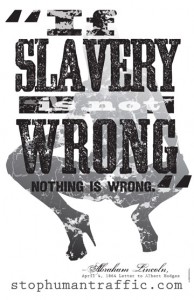Hillary Clinton wrote an op-ed piece in the Washington Post today regarding human trafficking and the Trafficking in Persons Report 2009, which was released by the US Dept of State last week ::
Twenty-year-old Oxana Rantchev left her home in Russia in 2001 for what she believed was a job as a translator in Cyprus. A few days later, she was found dead after attempting to escape the traffickers who tried to force her into prostitution.
Oxana’s story is the story of modern slavery. Around the world, millions of people are living in bondage. They labor in fields and factories under threat of violence if they try to escape. They work in homes for families that keep them virtually imprisoned. They are forced to work as prostitutes or to beg in the streets. Women, men and children of all ages are often held far from home with no money, no connections and no way to ask for help. They discover too late that they’ve entered a trap of forced labor, sexual exploitation and brutal violence. The United Nations estimates that at least 12 million people worldwide are victims of trafficking. Because they often live and work out of sight, that number is almost certainly too low. More than half of all victims of forced labor are women and girls, compelled into servitude as domestics or sweatshop workers or, like Oxana, forced into prostitution. They face not only the loss of their freedom but also sexual assaults and physical abuses.
To some, human trafficking may seem like a problem limited to other parts of the world. In fact, it occurs in every country, including the United States, and we have a responsibility to fight it just as others do. The destructive effects of trafficking have an impact on all of us. Trafficking weakens legitimate economies, breaks up families, fuels violence, threatens public health and safety, and shreds the social fabric that is necessary for progress. It undermines our long-term efforts to promote peace and prosperity worldwide. And it is an affront to our values and our commitment to human rights.
I for one am glad to see Clinton bringing this to light through her position. I know it’s not the first time administrations have looked into this issue or talked about this issue. But I do hope that as awareness continues to rise this administration will really step up to the task of ending human trafficking in the US and abroad.
Read More
See the Dept of State report
(picture from Power to the Poster :: download. print. post.)


